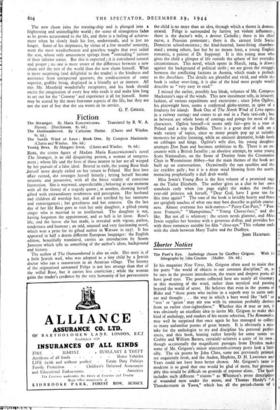Fiction
The Stranger. By Maria Kuncewiczows. Translated by B. W. A.
Massey. (Hutchinson. 8s. 6d.) The North Wind of Love : Book One. By Compton Mackenzie. (Chatto and Windus. 10s. 6d.)
ROSE, the centre figure of Madam Maria Kuncewiczowa's novel The Stranger, is an old disquieting person, a woman of tempera-
ment; whose life and the lives of those nearest to her are all warped
by her pursuit of a false ideal. Reared in exile, the young Rose finds *herself more deeply exiled on her return to Poland. Her first love affair ruined, she revenges herself bitterly ; letting herself become
neurotic and possessive, with all the fierce vitality of conscious frustration. She is wayward, unpredictable ; behaving at one moment with all the frenzy of a tragedy queen ; at another, showing herself gifted with extraordinary tenderness and perception. Her husband and children all worship her, and all are terrified by her tantrums and extravagances; her greediness and her remorse. On the last day of her life Rose goes to visit her, only daughter, a gifted- young singer who is married to an intellectual. The daughter is out, having forgotten the appointment, and so hell is let loose. Rose's life, and the havoc she has made, is revealed with vigour, pathos, tenderness and humour ; an odd, unusual and very fascinating novel, which won a prize for its gifted author in Warsaw in 1937. It has appeared in half a dozen different European languages: the English .edition, beautifully translated, carries an introduction by Storm Jameson which tells us something of the author's ideas, background and history. The author of The Outnumbered is also an exile. Her story is of a little Jewish waif, who was adopted as a tiny child by a Jewish doctor who ran a sanatorium in an Austrian village. The history of the stigmatised unwanted Fehge is not less strange than that of the wilful Rose, but it carries less conviction ; while the woman gains the reader's credence by the very humanity of her perverseness
the child is no more than an idea, through which a theme is demon- strated. Fehge is surrounded by furtive. yet violent influences ; there is the doctor's wife, a devout Catholic ; there is his chief nurse, a Prussian protestant ; there is thc earnest little Social Democrat school-mistress ; the kind-hearted, loose-living chamber- maid ; among others, last but by no means least, a young English romantic, a patient of Dr. Sapponyi It is this young man who gives the child a glimpse of life outside the sphere of her everyday circumstances. This novel, which opens in March, 1924, is drawn
against the background of political strife ; we are given the struggle between the confficting factions in Austria, which made a prelude to the Anschluss. The details are plentiful and vivid, and while the book is rather -over-long, it is also of the kind most people would describe as "very easy to read."
I missed the earlier, possibly less bleak, volumes of Mr. Compton
Mackenzie's saga of the winds. This new instalment tells, in leisurely fashion, of various expeditions and excursions ; since John Ogilvie, his playwright hero, seems a confirmed globe-trotter, in spite of a fondness for islands Book One of The North Wind of Love opens in a railway carriagt and comes to art end in a Paris taxi-cab ; but in between are whole hosts of comings and goings for most of the characters. s Ogilvie himself—it seems only fair—gets in a tour of Poland and a trip to Dublin. There is a great deal of talk on a wide variety of' topics, since so many people pop up at suitable moments for polite listening, while an eminent dramatist, holds forth on cabbages and kings. Ogilvie's wife dies, his young daughter attempts Don Yuan and becomes ambitious to fly. There is an en- counter with a British Israelite ; an abortive attempt, by some young Scots Nationalists, on the Stone of Destiny from the Coronation Chair in Westminster Abbey—but the main themes of the book are built up on conversations. Occasionally the sun sparkles and the
-ice crackles gaily ; but it is a drear wind blowing from the north, menacing prophetically a dull drab world.
Miss Irwin's Young Bess is the first volume of a promised saga on the Tudor Elizabeth. The author gives us a clue to her own standards early when (on page eight) she makes the twelve- year-old princess ask herself, "Dear God, have I gone too far this time again? " The tone of the book is lavishly hearty and there are sprightly touches of what one may best describe as girlish coarse- ness. Almost everyone has nick-names—" Pussy-Cat-Purr," "Fox- nose Francois," " Mumpsimus," "Young Cheese-face," and the like. But not all is whimsey : the screen needs glamour, and Miss Irwin supplies her heroine with a generous dollop, and provides her with three romances suitable for film "close-ups." This volume ends with the clash between Mary Tudor and the Dudleys.
JOHN HAMPSON.


























 Previous page
Previous page